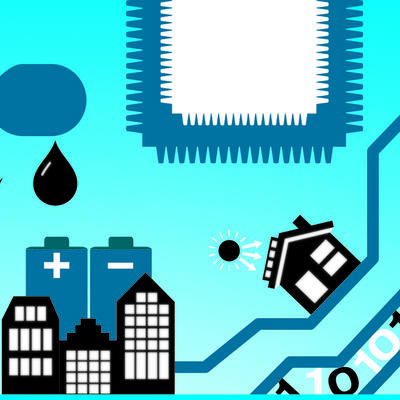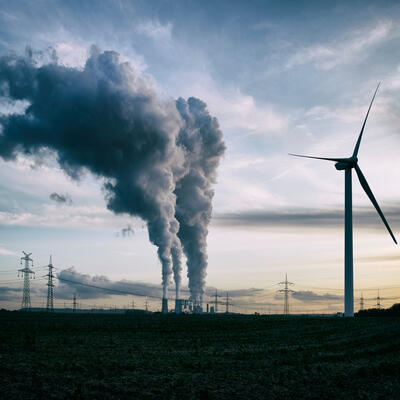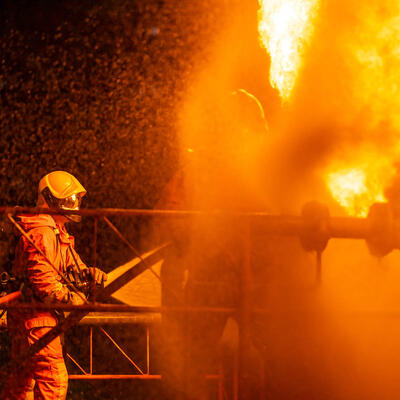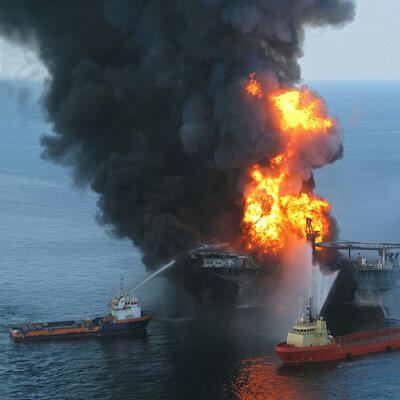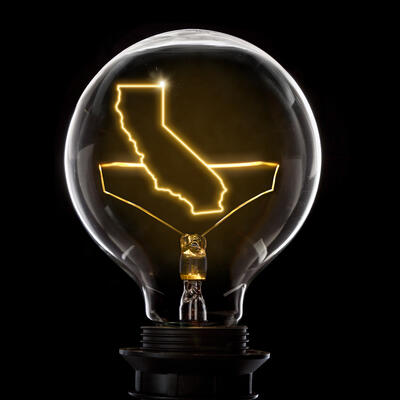Greg Dalton: Today on Climate One, we are talking about technology innovation empowering America's economy in a hot and crowded world. More than two and a half billion people in China, India and other developing countries move out of poverty and into urban jobs and lifestyles in the next 15 years. That seismic shift will have a profound impact on the global economy and demand for resources. It will also send carbon pollution already dangerously high soaring further driving more severe weather unless new technologies and policies come on fast. Over the next hour, we will talk about this resource revolution with our live audience at the Commonwealth Club in San Francisco. We are pleased to be joined by three experts with deep business experience.
John Hofmeister is former president of Shell Oil Company and founder of Citizens for Affordable Energy.
Amy Myers Jaffe is the executive director of Energy and Sustainability at the UC Davis Graduate School of Management. She is co-author of
Oil, Dollars, Debt and Crises: The Global Curse of Black Gold.
Matt Rogers is the director at McKinsey and Company and co-author of the new book:
Resource Revolution, How to Capture the Biggest Business Opportunity in a Century. He was a special adviser to the US Energy Secretary Steve Chu in 2009 and 2010. Please welcome them to Climate One.
[Applause]
Greg Dalton: Thank you all for coming.
Matt Rogers, let's talk about a world, a hot planet with 9 billion people. How are we going to feed and fuel that planet?
Matt Rogers: So Stefan Heck and I started to write
Resource Revolution in part because as we worked with business executives, they were struggling with this issue. If you see two and a half billion new people entering the middle class, 9 billion total people on the planet you say, my goodness, we are going to run out of resources and at the same time the resources are getting harder to extract, so we are going to see commodity prices high forever and therefore it is going to be a giant mess. As we got into it and started talking with various folks, we came to a conclusion that in fact it was an enormous opportunity. The technology was actually moving much faster than the market expected that the combination of information technology with traditional industrial technologies actually was unlocking a set of business opportunities that were very large and that would mean that we could change the way we both produce and use resources in a way that would allow us to meet the needs of two and a half billion new middle class without seeing either the economic or the environmental disaster that a lot of folks thought was going to happen. And so that's why we sat down and wrote the book and tried to bring it to life with a set of stories about technologies that really were changing the world. So if I can just use a simple example. This is a replica of one of the original light bulbs that Edison produced. When it came out, it is important to remember, I like doing history a little bit, when it came out, it cost 20 dollars. It cost 8 dollars per hour to run and it lasted for 15 hours. They delivered it in an egg carton because it was so precious to be able to do that and yet this little light bulb ended up changing the world. But it was an exotic technology when it showed up. Now if you go to the Ace Hardware over there today, you can buy this, which is an LED light bulb with a radio transmitter inside that you can download the iPad app to control this light bulb from your touch screen. This one lasts for a decade. They have other competitor products that last for 25 years and this thing uses one-tenth of the power of this thing to achieve the same goal, and what we are seeing in industry after industry is this kind of 10x productivity opportunity, and when you see it happen in autos and in lighting and in oil, you begin to say, "Hey, we are going to change some of these markets," and that's what managers need to be ready for.
Greg Dalton: You write that right now LED light bulbs are about 2% of the market, you think they'll be 80% by 2020? That's a big change but also means a big reduction in energy demand, less electricity to run those things.
Matt Rogers: That's exactly right. So we have gone for almost 100 years. The electricity demand in the United States grew by between 6% and 10% each year for 100 years. We are now at the point where we're bouncing along at let's call it 1% and we could easily end up and likely will with the introduction of things like the LEDs and other control technologies. We will likely see electricity demand go down even as we see electricity services increase in the market place and that obviously has big implications for how you run a utility. When we set up the rules for running utilities in the 1920s we sort of assumed growing demand forever to take all of this capital and advertise it across lots and lots of customers. And now if demand goes down, that changes the fundamental economics of the industry.
Greg Dalton: You write about there is a joke about how many people it takes to screw in an LED.
Matt Rogers: [Laughter] So I was flying down with the vice president and the secretary to North Carolina to Cree which is one of the big light bulb manufacturers and the secretary decided to write his own joke which had the press rather in a tizzy, but the joke was so how many people does it take to screw in a light bulb? None. Grandma put it in 25 years ago and it's still growing strong, and that I think is the core of when you get a 10x improvement in the lifespan of a technology, all of a sudden what you view about the standards of infrastructure change. You don't have to go back every 12 to 18 months to go replace that light bulb. It just stays there and works and does its job for a long period of time.
Greg Dalton: Amy Jaffe, do you agree that energy demand will go down in the future and technology will bring this kind of tremendous savings?
Amy Myers Jaffe: Well, you know I definitely believe that. It is not a popular view in the energy industry, but if you look at actually the trends, we can see it here in the United States. So gasoline use and actual vehicle miles traveled in the United States has been falling and not rising as has had been previously predicted and when you think about it, it is a little easier to explain here in California, but when you look across the country, it is a very small number of cars that people are buying that are electric or electric plug-in or partial electric hybrids, and so that technology hasn't even really hit yet and we're still seeing you know these improvements so I think that the single biggest thing we've done to contribute, you know the light bulbs are going to be important but the big thing is going to be these revolutionary changes in automobile technology are really going to change the demand outlook for oil and you know one can imagine over time that the trends we are going to see here in the United States whether it's that you're going to have an app that controls your whole house and you're going to be able to give the electricity back to the utility, they'll pay you a dollar for that in some markets here in the United States. You know, if you're willing to have your air conditioning go off for 15 minutes to defer to some industrial user to make sure there's no brownout, that's not going to make your house get hot in 15 minutes could be very energy saving for the whole energy system in your communities. Those kinds of things are going to really make real serious differences in demand trends here and there's no reason to suppose that as we see the rise of the middle class in places like China and India and other countries that they'll be able to leapfrog maybe not to the exact same technologies as we have but to also more revolutionary technologies that will make all these straight line forecasts that Exxon Mobil uses as its reason for why it's not worried about a carbon-constrained world. Those forecasts are not going to materialize.
Greg Dalton: John Hofmeister, will those forecasts materialize? Would electric vehicles disrupt the oil industry?
John Hofmeister: I think if you did a video tape of today and just did an overview of how we live in 25 years it would be as outdated a way of life as if we showed a video tape from the 1960s and what life is like back then. And the reason I go back so far is that the amount of change it will occur in the next 25 years is to me double or more the change that has occurred from the 60s until now. Whether it would completely disrupt the oil industry to get to your fundamental question, I don't think it will but the oil industry will stop growing. In other words, the two and a half billion that are coming into the middle class will soak up a lot of what would otherwise be excess capacity which would be shut down. So were that two and a half billion not to exist? Yes. It would radically reform the oil and gas industry as we know it, but I think transportation will be one of the major causes of this. It is already starting to happen with the electric vehicles as you mentioned, but let's remember that in today's world, we can't produce enough oil. We can't begin to embrace the two and a half billion when oil is 100 dollars a barrel on the basis of weak global economy, worst recession since the depression and slowest recovery in modern history. Why has oil sat around 100 dollars a barrel consistently for the last four years? And the reason is we can't produce enough to bring up the supply to meet the growing demand globally. So we have to do something that Silicon Valley is famous for in information technology and in telephony.
My view is if we are going to enjoy mobility, I don't know any American that doesn't enjoy mobility, but not at 100 dollars a barrel. Middle class families can't really spend that much more on gasoline. What we do is we move away from gasoline as the primary product for our vehicles and it is not just that you run out and buy at Tesla at 80,000 dollars and wait for six months or longer but or go out and get a Volt, but rather we can convert our existing cars as well as all new cars going forward to flex-fuel vehicles and we dramatically increase the amount of alcohol fuel that operates in an internal combustion engine the same way gasoline does, and whether that's from biofuel or whether that's from natural gas, and I'm a strong proponent of natural gas, until we can electrify more of the fleet. I have no doubt in my mind that the primary cars that will be bought in the 2030s will almost all be electric whether battery or whether hydrogen fuel cell, but in the next 20 years, we can't continue to watch the oil price rise and maintain economic growth at the same time so let's disintermediate, to use the Silicon Valley term, disintermediate the fuel supply and produce half of what we need of liquid fuel from natural gas and biomass, call it methanol. We can do that which is an economic accelerant and we will enjoy mobility as we always have and it will be even more affordable than today.
Greg Dalton: Matt Rogers, there’s a term that’s seen about these days called "peak car" [Laughter] that I haven't heard about until recently, but tell us about peak car and the value of parking spaces in San Francisco and what that tells us about mobility and disruption.
Matt Rogers: I was gonna say, building on John's piece, the other thing that is changing is that next generation actually doesn't take to owning a car quite as much as certainly my generation did, and what we're observing are services like Uber and Lyft and others, this idea of sharing becomes quite important. The average car, I always joke, when you buy that beautiful new car you really must like it because you're buying it to park it. The average car is parked something like 96% of the time, so take a good picture of it in that parking lot, and here in San Francisco, you pay for a really expensive parking space to go with that really expensive car. Now what's happening even in San Francisco as rents continue to rise, we have seen the change in one dimension which is the rent for a parking space in San Francisco is now falling and it's falling reasonably dramatically because the incremental, the next renter doesn't have a car and thinks that the Uber and Lyft will do just fine and so the value of that space for parking that beautiful new car is actually declining even as we watch rents and other things in this city go up quite significantly and we think that this combination of substituting different fuels, electrification or other substitutes, the ability to share automobiles and then a whole set of the things that the Google car introduced in terms of automation technology that now every one of the big auto makers are adopting mostly in the 2017 model year are going to make the need for fewer cars but they will be much safer and much more efficient. To Amy's point, one of the things that the existence of electric vehicles has done is it has raised the bar on the performance of every type of engine and so we have dramatically more efficient internal combustion engines as well as electric engines as well as natural gas engines and it's that competition keeps raising the bar, it will be actually quite straightforward to meet the higher fuel economy standards. So all of these things piece together. We see a very different transportation network than we could have even imagined a decade ago.
Greg Dalton: So fewer vehicles shrinking to flat energy demand in the United States, but there are still teenagers in India and China who want to get a new car and is that where the growth will be and that might be an opportunity for you as companies and then what does it mean about the carbon question,
Matt Rogers?
Matt Rogers: So clearly you are seeing growth in India and China though interestingly in China where a car is a big status symbol, you also see the development or attempted development of sharing services because you want to talk about a very expensive place to park your car. Shanghai is unbelievably expensive place to have a car parked. And so I think what you'll see are this next generation adopting transportation technology in fundamentally different ways than we have had in the past. There will be incremental demand but it won't be nearly as large as I think some of the forecasts even five years ago would have suggested.
Greg Dalton: What are some industries that are going to be disrupted most by this? What are the biggest innovations and what industries are really going to have their world rocked by this?
Matt Rogers: Well, we clearly talked about the automotive industry and if you miss a product cycle in automotive, it's going to be quite challenging because each product cycle is bringing in a new set of efficiency technology, automation and control technology and safety features that the consumer really, really wants and it's technology driven, so what you see now in Silicon Valley is every one of the big automakers now has a big Silicon Valley presence to make that happen. So I think you'll see a change there. We will see change in the electric power sector when you see demand begin to decline. All of this and your standard home have some sort of ability to sell back into the grid whether it's with a Nest-like device or something else. That changes the way that whole industry operates if you have here in California substantially more distributed generation, solar and other resources that sell from homes back into the grid. So power changes a good bit, but other industries change as well. You know, John is talking about oil and gas and the development of the fracking technologies which is driven off of the same thing. Information technology and industrial technology changes the fundamental economics of oil and gas on a global basis and really raises the bar on what you have to do from a performance standpoint. Same thing by the way in buildings. We profiled a company called DIRT, Do It Right This Time, which is a Calgary-based company. Your standard remodel sends roughly 40% to 50% of the material delivered to the site. The 40% to 50% ends up going to the dump because of the inefficiencies of our building processes. And what you are seeing now in China importantly are a set of companies that design in a modular way that you can essentially do it all with almost no waste and they assemble it in modules and deliver it to the site where companies are now building large buildings in weeks rather than months because of the efficiency that comes from taking a much less resource intensive way to construction. So it's happening in industry after industry on a global basis.
Greg Dalton: We have had Ann, CEO of Project Frog who was here talking about these modular buildings. Amy Myers, let's ask you about fracking and how that's disrupting and changing the energy industry in the United States.
Amy Myers Jaffe: Well, I mean it has brought about an incredible change and to John's point that oil prices haven't come down, had we not had this technological breakthrough, we would be having this panel and we would sound like 1973 because the amount of oil production that has been disrupted in Libya, in Nigeria, in places that you see on the news, having terrible crises in their political framework and the stability of their societies, those things have disrupted you know several, I mean maybe two or three million barrels a day of oil that would normally be coming to market and there are, you know, concerns that it could become worse as the problems say in the Middle East or even now we all have to worry about you know what happens in Russia and the Ukraine. All these things affect our energy supply, but the reason you are not really feeling that is because this dramatic technological breakthrough that we are having in the United States and I am hesitant to use the word fracking, right? You know, fracking has this hugely pejorative meaning now in the United States where it's like saying, "Yes. We're gonna pollute every speck of water in the United States, gonna cause earthquakes all around the country and that's how we're gonna be able to have energy security," so I want to divorce myself from that word and just say that the oil industry has developed new technologies, some of which is fracking and some of which is totally different, to be able to produce the oil that is sitting and trapped in the actual source rock. So in the past, the oil industry and we all know it because we all visually watched BP post Macondo. The oil industry had to have these giant computerized seismic technologies followed by these giant, you know, city-like structures to look for oil deep in the ocean or in other very hard to get places and what they were doing is you know imagine an image of the globe and I'm trying to find a pinprick that when I drill at that pinprick, there would be a little pool of oil thousands and thousands and thousands of feet under the earth and I would be able to find that tiny little pocket of oil.
Well, that pocket of oil was formed because oil that was trapped in rock all around it sort of seeped and migrated into this little trap, this little hole in the ground and then somebody from an oil company used all kinds of equipment and science to find the oil in that tiny little hole in the ground, right? Now, what the industry is doing is it is producing the oil and natural gas right from the source rock. Well we all know where the source rock is. We don't have to spend millions and hundreds of millions of dollars trying to find the little trap under the ground. Now all we need to do is use computer assistance and geosteering drilling and sensor technology and new technologies to try to figure out how to produce little tiny molecules of oil from the actual rock where it is sitting. And that means that it's everywhere.
Now the fact that it's everywhere is an unbelievable opportunity given the fact that today we have over 300 million liquid fuel cars and we have to put something in them to go anywhere, right? What makes it a difficult thing, I think across the country is that this oil is everywhere, and so we're all - as I’m speaking to an audience here in California but I know there will be listeners from other places – everybody is used to having all of that oil produced in Texas or Louisiana or Alaska, places where it doesn't affect your everyday life. But now this shale, whether it's oil or natural gas, could be produced here in California, could be produced right here in Los Angeles, could be produced in Ohio or in Arkansas or in Colorado or in Pennsylvania, so……
Greg Dalton: In people's backyard, it brings it closer to home. It is a disruption, but what about the water consequences of all those sorts of things? I'm thinking……
Amy Myers Jaffe: Well, you know like many things, it's an engineering system. If I'm doing it well and I don't have any kind of problems with my engineering system, then theoretically there should be no problem with the water. I mean you are taking a cement casing and you are having a drill inside, you know steel and then cement and so forth and you are going, you know, thousands of feet under the ground through solid rock and then you are spraying water, you know, 7,000 or 10,000 feet under the ground through solid rock and there's no way for those chemicals to float back up to the surface. It's deep under the ground. The question is you know what would happen after I brought that dirty water back up and I had to dispose of it? You know, am I disposing of it carefully or am I throwing it in someone's backyard coz that's the cheapest thing to do, right? When I'm pouring my cement, we all learned about cement post Macondo, they didn't pour the cement correctly, right? So am I pouring the cement correctly or am I using the highest quality cement or not?
And then there's a new technique in the industry which is called green completion. So when I'm doing all this operation, you know, I can have a very enhanced closed loop system where everything that's coming out of the ground is going through a pipeline into a solid tank, you know, and it is going to sit there until it is ready to be processed or taken away or you know believe it or not here in California and some places where there's oil production and I don't mean necessarily production from fracking but just oil production in general, we take some of this water from under the ground that we have used when we are producing oil and we just put in an unlined pit on the ground and this is not a good thing. You know, in other states they banned that. Even here in California where we pride ourselves on environmental protection, we don't actually have the highest of green completions in all our oil production.
So getting every place across the country to use these best practices, you know, is a challenge and it is a challenge that President Obama is trying to do on a federal level. They have tried to come up and propose some federal standards and they are pushing for that. There are a lot of places that want it to be state by state, a lot of states that say it is a state’s rights issue and so, you know, we are a democracy. It is going to take some time to work it out, but the oil industry needs to take on my opinion the responsible role in this sense. If they don't take a responsible role, then more and more communities will opt out and will say, "You know what, we don't want this kind of drilling here. We don't want to undertake the risk." And you can see that debate even here in California where on the one hand it would be great for the budget and the economy but on the other hand there are a lot of communities, I think rightly so, don't want to take the risk. So it really is about whether the industry can show that it can rise to the top level of environmental performance.
Greg Dalton: We are talking about America's energy future at Climate One. I'm Greg Dalton and our guests are
Amy Myers Jaffe, executive director of Energy and Sustainability at UC Davis,
Matt Rogers from McKinsey and Company and
John Hofmeister, former president of Shell Oil.
John Hofmeister, can the American people trust energy companies to do green completions to do the right thing that
Amy Myers Jaffe was just talking about, or will government have to force them?
John Hofmeister: Well I think it is a trust and verify response. So trust is not enough but you can certainly verify whether people are following well-articulated regulations. I tend to think of a drilling site as a construction site. Construction sites are messy especially if it rains. You have got debris that can be kept in orderly fashion or not. You can have safety practices and safety procedures on the construction site but if someone doesn't tie their lifeline to something substantive to hold on to their life, they could fall and die. But when all are said and done and all the debris is cleaned up and all of the building is now polished and clean, we love what we have after the messy construction job.
Drilling sites can be exactly the same and I think that they should be the same. They should have green completion requirements and if some companies are unwilling to step up to that, let them go do something else. Because I think that there is a social responsibility associated with the opportunity to extract natural resources for a profit and that social responsibility is "don't ruin my back yard." The movie Giant which many of you may have seen years and years ago, the movie Giant or the movie Urban Cowboy that took place in Houston, these movies gave such an impression of an industry that perhaps existed at some point in time but it’s not the industry that I worked in today other than where there are some operators that do not take a socially responsible position because the industry I worked in and retired just a few years ago in places like the Netherlands right next to Amsterdam or places in the UK, right in the southeast, south of London or places in Germany where Germans are very particular about their property.
They're drilling and they're drilling where that you can't see the drill. There what appears to be a building around the drill. You can't see the lights at night. They're blacked out so that the neighbors can sleep and there is quiet muffling that takes place. If we can do it in the Netherlands and in Germany and the UK, why can't we do it in Louisiana, Texas, Arkansas and California? It is well known how to do responsible drilling. It is well known how to run a clean construction site. There are construction companies that compete for who can get awards, publicly recognized awards for how responsibly they build a building or build a home and the neighbors are not, you know, turned off by what's happening in their neighborhood. The same thing should happen and there is no reason that it can't be paid for. It can be paid for. It's not that expensive.
There is a group in Western Pennsylvania of five environmental groups and five drilling companies that came together to set the golden rules of fracking which they have all signed up to voluntarily. My former company is one of those five companies that signed up for it. I had a hand in trying to get the parties together a few years ago. Many in the industry have decried this as, you know, creating this fragmentation of making it more expensive, making it harder, and maybe we should just give up on Western Pennsylvania. Good! Give up on Western Pennsylvania. Leave it to my former company [Laughter] and I own shares in it, so I'd love to see it happen, but do things at the right standard because that's the way you have sustainable operations and otherwise is a dirty company. Many of us take the product of an abattoir. It would be very hard to walk through an abattoir and want to have a steak right afterwards, but we do that because abattoirs are highly regulated unless they break the law.
And we trust the product that comes out of it and I'm okay with that. I'm okay with drilling for oil and gas in ways that the drilling site is the abattoir but let's set the regulations that people will follow and be thrown out of the countryside if they don't follow the regulations.
Greg Dalton: Does that make you popular in Houston down at the bar where you're talking with the oil guys. I mean, did they want more regulation? Don't they often push back through their industry associations against those very regulations you're asking them?
John Hofmeister: There is a problem with lowest common denominator. You're absolutely right. I'm not welcomed in some groups because they don't want to hear what I have to say, and when I am in an industry convocation and I say you deserve to have your license taken away from you, you should not be allowed to operate if you can’t operate to the best practices. There are some people in the room who wish I'd go away, but there are people in the room say, "Speak more loudly. Help us help ourselves," and that's why I do what I do and I speak out quite frankly on these matters and have a reputation for straight talk. And so I don't mind the consequences of some companies who say please go away. I'll probably outlast them because the social responsibility requirements are getting tougher and tougher. I was out here in Kern County last year talking to a group at the Community College in which the whole subject of the Monterey Shale came up and do we dare in California approach the Monterey Shale and I realize there has been a recent write down of the potential reserves from the Monterey Shale but that could change with technology. You know technology changes everything. And so yes, I think you can develop the Monterey Shale. Yes in California. Yes despite the seismic risks associated, if you do it right. And so I don't mind saying this. I'm not looking for popularity. I'm really looking for the importance of energy flowing in to the system so that we don't have people who are so politically correct that they would stifle economic development or that they would resist employing people who need jobs because they think there is something wrong with oil and gas. Oil and gas has been around for a long time. It will be around for a long time. We don't yet have the capability to displace it and for anyone who says, and I read Mark Jacobson's work and I have been on panels with Mark Jacobson at Stanford who I respect enormously but disagree with.
Because there is such a demand for energy, we can't get there from here on the path that we're on and so we need new paths, one of which is more oil and gas so that we can continue to grow our economies and provide jobs for people.
Greg Dalton: John Hofmeister is a former president of Shell Oil Company. There is something called the carbon bubble. People talk about this stranded assets these days and this is the idea we have been talking a lot about energy supply but scientists say and some simple math and even some investment banks have said if we burn all the carbon and hydrocarbons in the ground, we will fry the planet, and that some of these assets, refineries, pipelines, etc., will become stranded assets. We’ll either have stranded cities like Miami or some stranded assets.
Matt Rogers, you talk with energy companies, I want to get all of you in on this, is this gaining wide more acceptance the idea that we can't burn all the carbon we've been talking about?
Matt Rogers: I think there are a couple of levels to the conversation. The first level of the conversation is if you look at the valuation for most of the oil companies, for example, or coal company in the market today. The market actually is putting very little value on assets much beyond 10 years and so any discussion about what stranded assets looks like is really looking out past a decade and currently in the market values there’s actually relatively little of that, and so I think this is a forward conversation as opposed to a today conversation in that regard. And I think what we are observing now is this competition. You know, John is talking a lot about who can develop these resources in ways that are the most economically attractive over long periods of time, and part of that involves looking at resource and saying, I'm drilling a 30-year well and not a 5-year well and that changes the economics quite considerably. We're looking at how do you take aerospace technology to make oil wells safer, more reliable and dramatically lower cost as you go through there. It is that competition that I think will ultimately sort this out, you know, quite readily.
Greg Dalton: Amy Myers Jaffe, Shell made a big play in the arctic. Do you think that was a mistake? Will there be some stranded assets in the arctic?
Amy Myers Jaffe: Well, there will be if they make the mistake of investing there. I mean, you know, in the end, the trend line I think is very clear. The trend line is clear that we want to decarbonize the economy and I am sure there are some people in other locations in the United States that don't feel that as strongly maybe as our audience here today, but you know that is a trend line. Even the polling in China shows agreement among younger generation people with that trend line. So the question is, you know, two questions. Number one, what does that mean for companies and their performance? So I'll tackle that one first. If you are a company, and you are taking your shareholder dollars and you're doing a project where you're gonna spend 10 years trying to develop that project in the arctic or in the deep water in Brazil or in the Russian arctic, and then you're gonna do 10 years developing it, and then it's gonna take you 20 years to actually produce the oil and gas.
You know, if I were picking the stock, I'm not sure I'd want to own that stock, right? [Clapping] I mean you know, it's just like even just as a casual investor. Now the interesting thing about investing though and I've done a paper on this with a professor at the Davis Graduate School of Management. It's a really interesting question. So in 2009, we had a breakthrough science article that was based on you know existing science but it became a seminal article in the industry, written in nature by a group of scientists and they said in order for us to hold at a two-degree warming, we can't burn this, you know, we're not gonna be able to burn the fossil fuels that we're using today. We have to make a dramatic shift.
Interestingly in 2009, the stock market did not actually ignore that article and 63 of the largest US oil and gas companies shed 27 billion dollars in their share price. So it is not correct when people say, "Oh yeah, yeah, yeah, you know, unburnable carbon is a non-issue. We all have cars and we're gonna have to use that oil." You know, it's not a small issue. Now, but there is the practical concern which is that, you know, everybody in here or maybe not everybody in here but across the country, a lot of people still have a car and it still runs on gasoline, right? So when you take how you see the demand is gonna change over time and you look at the net present value of a dollar and a barrel of oil today, and then you think through what the stock should be 30 years from now and you compute that back you know financially, you know, the stock is not that, I'm not saying it is not overvalued at all but there is some present day value that gets recognized in the current stocks share price that might not reflect what we think might happen in 30 years because of the, you know time value of money. So the question really is gonna be, over time, you know, what is the policy framework that's gonna come in and you know a lot of discussion goes into - Matt mentioned Mark Jacobson and Mark Delucchi's very interesting article about how much renewable energy resources we have here in the United States and is it physically possible to turn to 100% shift to those resources. So the question is not whether it's physically possible. The question is what will be the business model to get there, right?
And what I liked about
Matt Rogers and [Stefan] Heck's book is it opens our minds to the fact that the business model might actually come literally through innovation. So you know am I gonna control what I do in my house from my phone? Do you know what I mean? Am I willing to actually have my air conditioning turned off when I'm not home by my utility to save energy, you know, and the question is not am I willing to do it to save money? Because you know to a lot of people, just making sure their house is cold when they come home, not everybody is as socially oriented as somebody else, right? So it really becomes a matter of personal responsibility
And at Davis, we have a whole center at University of California Davis where we work on nothing but these efficiency-type issues, so for example, when you're turning on your air conditioning, if you have leakage in your house or in your vents or in your home, right, or in your office building, then you're just blowing the cold air and half of it is going outside, so it's horribly wasteful. So you know what are the technologies that we have and we have some that you know can either seal up your vents or measure how much is leaking so you can figure out where it is or sensors so you can figure out what it is. You know, people complain about the issue of how much methane gets leaked out when we use natural gas and that makes it a much more dirty fuel than it could otherwise be. Well, if you had some kind of a seal-it technology which we're working on that would close up the leakage in the pipeline or you had sensors so you'd know where the leaks were and you could repair them quickly, then you could at least remove that methane from the atmosphere.
So there are a lot of things we can do but, you know, what's the business model? Because there are two ways of doing it. One is to have the government come in and say, "Okay, we're gonna do and we're gonna pay for it," and that means you all have to agree to pay the tax burden of that, right? Or we're all magically hoping that just the innovation that you know Matt showed you the light bulb. It just gonna magically happen overnight and you are gonna buy this light bulb. That's we're all hoping for, but you know what, that takes some action on our own part.
Greg Dalton: Let's get that. I want to give
John Hofmeister a chance to get in on the carbon bubble and stranded assets before we go to audience questions.
John Hofmeister, are there some hydrocarbons that need to stay in the ground or we will fry the planet?
John Hofmeister: I think that we will move away from hydrocarbons as time progresses because we have better alternatives and they will be in the ground forever because we won't need them because we have other alternatives. But in the meantime, we're gonna burn a lot of hydrocarbons because that's the way it is going to be. There is an estimate of more than 1,200 new coal plants to be built across China, India and the rest of the developing world over the next 25 years. Twelve hundred. If you shut down every coal plant in the US, those 1,200 will far exceed what we have tried to do in the US and in Europe to diminish the use of coal. So that's a reality that none of us have anything to say about other than perhaps complain, but if you write your congressman it won't do a darn bit of good. We don't have jurisdiction. As an alternative and I think the president and Gina McCarthy are headed in that direction but did not go far enough. They went as far as I think they practically could but didn't go far enough. I've written about and I've spoken about there is an opportunity to capture carbon. Put it under waste management. Claim – and if the president did make a mistake, it's doing what he did unilaterally without Congress and I realize Congress is not very cooperative. But by having a presidential decision this way, his successor could just turn it the other way and we go back where we came from if that's what the American people choose in 2016. We could reverse the decision that was made because it is just an executive branch administrative decision, so I have spoken out very clearly that the mistake made if there is one is that this was not a legislative formulation which the president then executes, but be that as it may.
Carbon capture and sequestration is much, there is a lot of pejorative around it in this country and that's sad. That's too bad. Because capturing that carbon and sequestering it, 99% of it is possible technologically.
Greg Dalton: But it is expensive and it hasn't been shown……
John Hofmeister: Well that's where you get the pejorative, sorry to cut you off. That's always the argument that’s made, but if you look at the life cycle economics of a power plant, you can pay for it out of the efficiency in the greater in the use of coal.
Greg Dalton: And Shell is doing that a little bit in the Canadian tar sands. I want to get you on one brief thing and then we are going to audience questions. When you were heading Shell Oil in America, one of the biggest pieces of legislation was AB32, California's landmark climate change law signed by Governor Schwarzenegger in 2006. The oil industry opposed it, Shell did not, why?
John Hofmeister: Be part of the solution and the only way to be part of the solution is to get in there and talk about it. I visited Sacramento myself a number of times to try to find what is the language that we could agree upon that could both assist our operations and what plans could we develop business wise that can be paid for at the Martinez Refinery or at other locations in California in order to best accommodate. There was no doubt in my mind that AB32 was gonna pass and you're either a player and you're gonna work with it or you're an opponent, you're an adversary and you don't count, and the legislative structure of California, I could count how many democrats there were and how many republicans and so you know where it's gonna to come out and you have a republican governor who is trying to do this with the democratic legislature, let's try to take advantage of the dialogue process, and so we put a team of people to work on it that met regularly with officials in the legislature.
Greg Dalton: And has that, being on the winning on side, the green side, has that benefited Shell since then? Because the industry has continued to litigate against every single carbon move that California has tried to do. They send lots of lawyers. They're playing defense. Has that accrued any benefit to Shell?
John Hofmeister: By virtue of the fact that Shell is not the enemy in this case, I would say so, but I don't speak for Shell anymore. But I think the fact that the industry continues to work against it makes it even more difficult for good public policy to come out of Sacramento that benefits the industry because it has continued to be seen from a popularity standpoint as the force against something good which is less carbon in the atmosphere and my former company for a long time has been all about let's reduce the carbon in the atmosphere and that's been the whole case in Europe where my former company was a leader in trying to use cap and trade, trying to use other regulatory regimes and technology to reduce carbon because carbon has been seen for a long time as something we should reduce or eliminate.
Greg Dalton: So it sounds like a lot of the oil industry is fighting a losing battle or going to be on the wrong side of history?
John Hofmeister: Absolutely. Because it can't think beyond the next step of making money. I won't name the CEO, but one CEO told me in the industry what a waste of time I was creating in the industry because he didn't know what my job was but his job was to work for shareholders, and I said, "Well my job is to work for stakeholders including shareholders, and stakeholders include the public that buy the product.” And we haven't seen eye to eye for a long time and probably never will, but I think there is something that goes beyond the immediacy of earning a profit for shareholders that speaks to the socially responsible requirements to operate in an ever evolving society and the dynamic is you work with others even those you disagree with to try to do what's best for all considered.
Greg Dalton: John Hofmeister is a former president of Shell Oil Company. I want to get
Matt Rogers real quickly. Matt, is it possible that things could change really quickly, that some energy companies could lose money and end up on the wrong side of history as
John Hofmeister just said?
Matt Rogers: Well I think what we are seeing are industry after industry is in fact changing very quickly and I think companies that don't adapt quickly to the market that we're seeing will in fact get left behind. This is a very destructive period for corporations that move too slow that one of the reasons that Stefan Heck and I wrote this book and one of the reasons we talk about it is as a resource revolution is the rate of change that is occurring in these underlying technologies is so much faster than it has been for decades that if you are a manager and you are running one of these companies, it is coming at a pace that you have never seen in your career and so the ability to adapt and respond at a pace that is commensurate with the change that is coming is often too slow and so, you know, what we saw at the last industrial revolution where a whole set of companies that went by the wayside because they didn't change fast enough and I think the same is true today. We are going to see a whole set of companies that don't make the adjustment, that don't take advantage of the 10X productivity opportunities that there are. And the companies that do will win and the companies that don't will in fact get left behind.
Greg Dalton: We're talking about powering America's future at Climate One. I'm Greg Dalton and our guests are
John Hofmeister, former president of Shell Oil,
Amy Myers Jaffe from UC Davis and
Matt Rogers from McKinsey.
Greg Dalton: Let's have our audience question. Welcome to Climate One.
Male Participant: Yes, John Addison. First, I love the book Resource Revolution. We heard about CCS. We heard about closed loop such as green completion. Contrast the adaptation we may see if there's no price globally on CO2 emissions and methane emissions versus the kind of innovation and adaptation we may see if there is a global price on CO2 and methane emissions.
Greg Dalton: Matt Rogers, will a price on carbon drive innovation?
Matt Rogers: Interestingly I think what we have are the commodity prices today are the single biggest driver of making that happen. Hundred-dollar barrel oil drives all kinds of innovation as does 16 or 18-dollar gas in Asia. That's been the biggest force for driving innovation. At least as we have done the economics, the marginal cost of abatement is actually relatively small and so the incremental value of that turns out to be not the biggest part. The biggest part is we've got very, very high commodity prices and that drives very large innovation at a scale and a pace that is well beyond what any of the policy makers were originally thinking about.
Greg Dalton: But hundred-dollar oil also makes the tar sands economically viable.
Matt Rogers: Correct and that I think this is a part of the debate is the relative rate of change of the various pieces. And again the argument that we make in the book is that the things that are happening fast is for those that take information technology and industrial technology and put those two together and the rate of change of that is so fast that it ends up outpacing a whole set of other alternatives in the game.
Greg Dalton: So you are optimistic that technology and companies will change fast enough?
Matt Rogers: Yes. We write the book with an optimism that companies and technologies are in fact changing fast enough. It's going to be one crazy ride for the next 20 years, but we are seeing the rate of change so fast in so many different places along with a whole set of tumult and Sturm und Drang. We’re going to end up in a very good place.
Greg Dalton: Let's have our next question at Climate One.
Male Participant: I’d love to hear your view on true cost accounting. There's a new set of practices around environmental profit and loss and natural capital or internalizing the externality. Do you see true cost accounting as a way of catalyzing the speed for adoption of resource revolution and is there an advantage to companies to voluntarily adopting environmental profit loss or true cost reporting?
Greg Dalton: John Hofmeister, Shell Oil, has an internal price on carbon pollution. I want you to take that one first.
John Hofmeister: Correct and ever since the late 90's, that's been the case where the price of carbon has been set and the economics taken into account the externalities of dealing with the carbon issue, looking at it globally, and so there's no project that gets evaluated that doesn't have the externality built in of at least carbon management. I think that there would be a huge row in the accounting association that sets the rules to try to take in the externalities because of the lack of definition in a rules-based accounting system which is the US system. It's a rules-based system where the lawyers and the accountants can argue, you know, how do you define everything that you are trying to define, versus a principles-based accounting system which is the European system. So I think there is a higher probability of success in a principles-based accounting system rather than in a rules-based accounting system. I worked in Europe for a number of years and got very comfortable with the principles-based accounting system which probably comes through in some of my comments, but I don't really see it happening in the US anytime soon.
Greg Dalton: It's too profitable to put the pollution in somewhere else.
Greg Dalton: Let's have our next question.
Male Participant: Hello. When it came to transportation, you all had a strange degree of agreement with each other and never talked about the issue of lifestyle change as part of it, only about technology change as if we could continue to support our lifestyle, moving the crutches around by simple changes in technology. The words public transportation for example did not come up once during the entire thing. All you talked about was re-engineering the car so we could fit more of them in the city, not re-engineering the city so that we would need less of cars. If this were a European audience, we'd all be laughing at you, frankly, and for just not considering a huge thing. You talk about young people reducing their use of automobiles and you talk about Uber and things like that, when that had very little to do with it. Public transportation, much maligned and kicked around in congress, Amtrak even with its huge ridership increases despite its poor amount of resources that has been given. I think it has a lot more to do with that and a lot more potential. So I think you're ignoring the fact that when it comes to transportation, the US is the third world country. We're the primitive country and you're just trying to support that. You're keeping us back, these kinds of attitudes. [Clapping] I would like to hear…… thank you.
Greg Dalton: So
Matt Rogers, the two and a half billion people that are going to move into cities need to move into different kind of cities that are less car based and that is happening a little bit in China who can't do the way we did it or else we're in trouble.
Matt Rogers: No question about it. So China is trying to build three cities the size of Chicago every year. That scale of growth in new urban footprint is truly remarkable just for the resources it requires to do that amount of building no less for the amount that has required to operate it and in order to achieve China's growth objectives, they have to do it in a fundamentally different way. They can't grow the same way. They're trying to do in 15 years what it took us 100 years to do in terms of urban build out, and if they do it in the same way, we end up breaking the equation. It just doesn't work. On the other hand I think we actually have some terrific new insights about how to set up cities that are dramatically less energy intensive, dramatically less resource intensive in all of their development. By the way, it links into water, it links into agriculture and how you make that work as well that are important in the design of cities and I think there is some great new approaches that are coming to how do you develop those cities that enable because otherwise you can't add three a year and make the whole equation fit.
Greg Dalton: John Hofmeister, the other piece of that is individual change, doing with less and less car based. Even if we redesign cities differently, there is a part there about behavioral change and even perhaps sacrifice.
John Hofmeister: Behavior change is hard. I teach at Arizona State University in the Global Institute of Sustainability and the person's point was right on because public transportation is a very critical part of the future of cities. But every time we dig into it in my class and these are students who are really aspiring to a sustainable way of life, when we look at behavior change and what has happened over let's say the last 50 years or the last 150 years or the last 15,000 years, people are hard to change. I think as we said earlier, our behavior patterns are pretty consistent and changing behavior is something that is done perhaps generationally, but my generation was going to save the world from itself in the post-Vietnam Era. Maybe some of you were part of that generation. We haven't done too well as a matter of fact and so I hear behavior change, but behavior change is so incrementally slow as to be I would say not even qualifying for the word evolutionary.
Greg Dalton: We have a podcast in the iTunes called Ecological Intelligence. That's all about that in the cognitive system. We have the author Dan Goldman of Emotional Intelligence getting into that aspect of emotional behavioral change and we have another program coming up later this year at Climate One on that. Let's have our next question.
Male Participant: We've talked a lot about this 20-year horizon where we may have electric cars and a de-carbonized world, but now we have this interval of 20 years and there is this I think accepted concern that we can't let the climate change more than 2% Celsius but yet most of this emphasis we've heard today has been on 20 more years of profit making extraction from as many places now as possible, turning the whole world into one large abattoir to use your metaphor, [Laughing] you know, and this maybe 20 years can be spent in other ways not using anymore extraction.
Greg Dalton: Can we do this faster?
Amy Myers Jaffe: You know, you're absolutely right. It has to do with commitment and that's really has to have commitment of the public. So if everybody in this room were to think about, you know, if there are people in here who have a personal automobile, how many years they keep that automobile? Average American keeps the car for 10 years, right? So if you think about just in our country, the wealth creation factor of how many years is it gonna take me? You know, either the transition to I'm gonna sell my house, I'm gonna move and live urbanly densely, I'm not gonna commute, right? Or I'm going to turn in my automobile for a better technology, you know, because really those are the two choices when you talk about transportation and I do see the willingness of the younger generation to consider those issues and also they think very differently about waste, right? So of the things I use and eat and buy, how much of it do I just throw away and how much do I seek to recycle, but you know in the end, the time loop of what it takes. If we are a wealthy enough country that President Obama could stand up tomorrow and say, "Okay, cash for clunkers. I'm gonna pay back every American who will turn in their car in the next two years." That would be great, but the reality is it will take at least a decade to turn over the current car fleet and the current car fleet runs on oil and, you know, that's just the way it is and if we don't like that, we need to take that action ourselves.
And so there are, you know, gonna be in the next five years vehicles that are gonna come on the market that would allow people to not make, you know, this horrible sacrifice where they are having to worry about the range where they can have a vehicle that runs on both fuels and, you know, people need to look at those cars or like the previous questioner said. People need to think about whether they can take the train or whether they could live closer to work and this idea that we are all commuting for an hour. You know, somebody did some a polling research at the University of California Davis, an unbelievable thing that came out in this one poll. It found that some people like to commute for an hour because they said it was the hour they get to be alone by themselves. [Laughing]
Greg Dalton: And listen to NPR. We don't mind that. We have to end it there. Our thanks to our guests today,
John Hofmeister, former president of Shell Oil Company,
Amy Myers Jaffe, executive director of Energy and Sustainability at the UC Davis Graduate School of Management, and
Matt Rogers, director at McKinsey and Company and co-author of the new book
Resource Revolution, How to Capture the Biggest Business Opportunity in a Century. I'm Greg Dalton. Thanks for coming in listening to Climate One today.
[Applause]
[END]
